牛津译林版八年级下册Unit 2 Travelling grammar(PPT29张)
文档属性
| 名称 | 牛津译林版八年级下册Unit 2 Travelling grammar(PPT29张) |  | |
| 格式 | zip | ||
| 文件大小 | 1.9MB | ||
| 资源类型 | 教案 | ||
| 版本资源 | 牛津译林版 | ||
| 科目 | 英语 | ||
| 更新时间 | 2022-03-06 08:46:43 | ||
图片预览

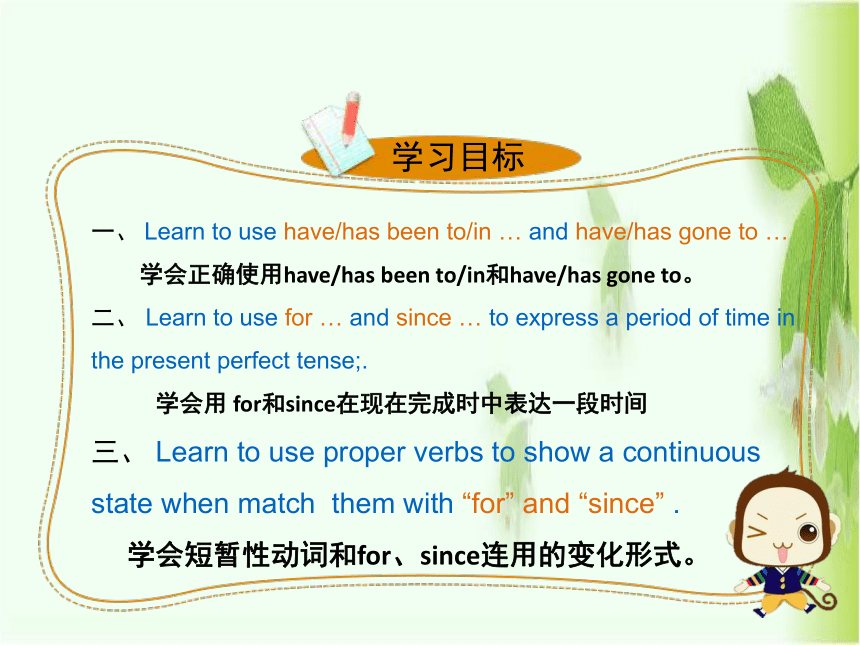

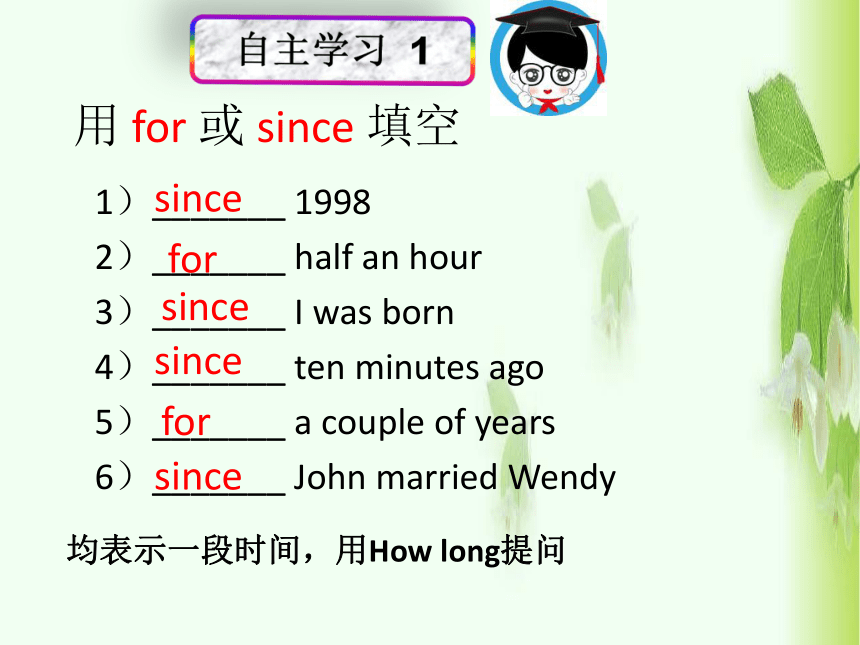

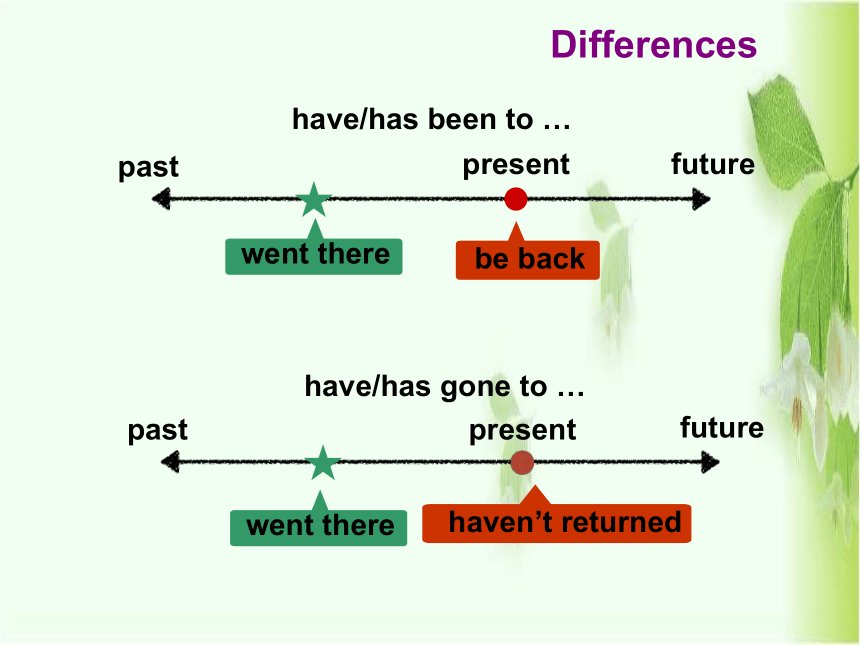
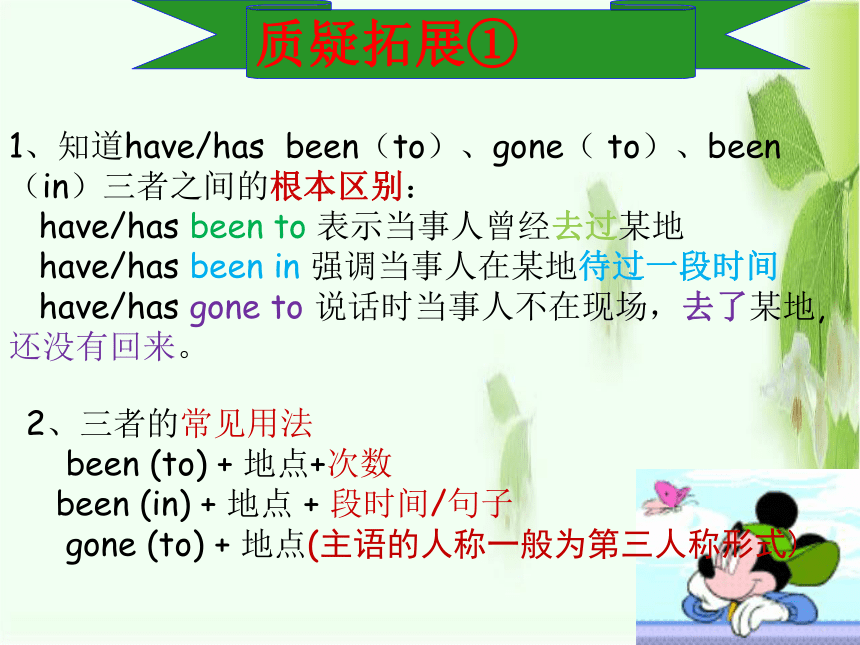
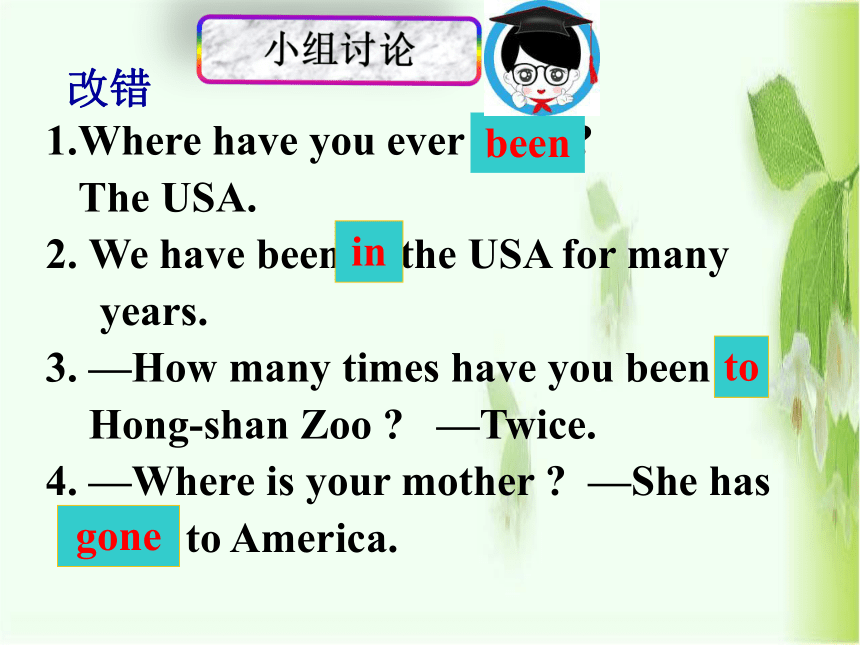

文档简介
(共29张PPT)
Grammar
8BUnit 2
Present perfect tense
学习目标
一、 Learn to use have/has been to/in … and have/has gone to …
学会正确使用have/has been to/in和have/has gone to。
二、 Learn to use for … and since … to express a period of time in the present perfect tense;.
学会用 for和since在现在完成时中表达一段时间
三、 Learn to use proper verbs to show a continuous state when match them with “for” and “since” .
学会短暂性动词和for、since连用的变化形式。
请说出下列动词的过去式以及过去分词
make
drive
go
buy
give
get
know
do
speak
swim
write
read
say
Warming-up
fly
用 for 或 since 填空
1)_______ 1998
2)_______ half an hour
3)_______ I was born
4)_______ ten minutes ago
5)_______ a couple of years
6)_______ John married Wendy
since
since
since
since
for
for
均表示一段时间,用How long提问
自主学习 1
1. My father ____________ Hong Kong.
He _________ there twice.
2. -- Where ______ you ______
-- I _____________ the library.
-- Is Li Lei in the classroom
-- No, he __________ to the teacher’s office.
3. I ______________ China for 15 years.
has gone to
has been
have
been
has gone
have been in
have been to
用have/has been to/in,have/has gone to填空
自主学习 2
past
present
future
past
present
future
have/has been to …
have/has gone to …
went there
went there
be back
haven’t returned
Differences
质疑拓展①
1、知道have/has been(to)、gone( to)、been (in)三者之间的根本区别:
have/has been to 表示当事人曾经去过某地
have/has been in 强调当事人在某地待过一段时间
have/has gone to 说话时当事人不在现场,去了某地,还没有回来。
2、三者的常见用法
been (to) + 地点+次数
been (in) + 地点 + 段时间/句子
gone (to) + 地点(主语的人称一般为第三人称形式)
改错
Where have you ever gone
The USA.
2. We have been to the USA for many
years.
3. —How many times have you been in
Hong-shan Zoo —Twice.
4. —Where is your mother —She has
been to America.
been
in
to
gone
小组讨论
( ) 1. –How many times ______you ____ to Beijing this year --Three times.
A. have, been B. had, been
C. have, gone D. had, gone
2. ( ) –Where is Han Mei now
--- She ____ to Shanghai. She will be back in two days.
A has gone B has been C goes D had gone
A
B
活学活用
( ) 3. —Where ______ Robin _______
--To Lucy’s home. He ___ there for an hour.
A. has, been; has gone
B. has, gone; has been
C. did, go; went D. did, be; went
( ) 4.–Jack, I haven’t seen your brother for a long time.
--He _____ Shanghai on business for two months.
A. went to B. has gone to
C. has been in D. has been to
B
C
活学活用
Verb with for and since
选用 for和 since填空:
1.We haven’t seen each other ______ a long time.
2.His father has been in the Party ______ 10 years ago.
3.The film has been on ______ 20 minutes.
4.Mr Green has worked here ______ he came to China.
5.His grandparents have been dead _____ 2010
for
since
for
since
since
下一页
(2) since +
for + 一段时间
eg. for 20 minutes
过去时间点
一段时间+ago
过去时的句子
eg. since 2010
eg.since 10 years ago.
eg. since he came to
China.
质疑拓展②
Discussion: Filling blanks with for or since and rewrite the sentences
since
1. I have lived here ______ 2002.
2. You have studied here ___ 8 years.
3. The boy has had a bad cold _____ last week.
4. Mr. Huang has kept the books ______ a month ago .
5.I have taught in the school _____ I came here two years ago.
6. Mrs Wang and Ihave been friends _____ years.
for
since
since
since
for
for 17 years.
since 8 years ago.
for a week.
for a month.
for 2 years.
since years ago.
注意:
主句中的动词必须是长动作----可延续性的动词,短暂性动词(come, go, leave, buy …) 不能用于带有for或是since的肯定句中。
他已经离开了。
He has left.
他已经离开三天了。
He for 3 days.
since 3 days ago.
has
leave
短暂性动词
→
be away
延续性动词
been away
延续性动词和短暂性动词
*延续性动词表示能够延续的动作。这种动作可以延续下去或产生持久影响。
*短暂性动词也称非延续性动词、瞬间动词。表示不能延续的动作,这种动作发生后立即结束。
英语中,动词按其动作发生的方式、动作发生过程的长短,可分为延续性动词和短暂性动词。
长动作(延续性动作)
短动作(短暂性)
arrive/come/go
die
buy
sleep
run
read
start/begin
join
listen
wait
write
chat
keep
fnish/stop
borrow
leave
Let's find!
Short actions, such as start, leave and borrow can not be used with for and since in the present perfect tense in positive statements. If we want to express a continuous state, we can use another way.
在现在完成时中,短动作,如start, leave and borrow不能在肯定句式中和for& since连用。如果我们想要表达一个持续性状态,我们需要用另一种方式。
Let's understand!
He has bought a car since 2007.
He has not bought any new cars since 2007.
He has had a car since 2007.
F
T
T
buy是个短暂性动词,不能在现在完成时中与持续的时间状语连用。
buy 是一个短暂性动词, 可以在否定句中与持续的时间状语连用。
如果想表达一个持续的状态,可以把buy变成have再用在现在完成时中。
类似的转换还 marry—be married
finish/stop—— be over 等
巧记10个短暂性动词的转换 (课本 U2 P28)
“开始离去借来还,加入(不)死买到(家)”
1begin/start be on 6 return be back
2 leave be away from 7 join be in/a member of
3 go be in 8 die be dead
4 borrow keep 9 buy have
5 come be in/at 10 arrive be in/at
同义句转换
1.They got married three years ago.
They ___ ____ married for three years.
2. I borrowed that book last week.
I ____ ____ that book since last week.
3.I bought the watch 2 weeks ago.
I the watch since 2 weeks ago
4.She joined the Reading Club last term.
She ___ ___ ___the Reading Club since
last term.
have been
have kept
have had
has been in
交流展示
短暂性动词的用法
短暂性动词可以用于现在完成时,但不能和表示一段时间的状语连用。
如:for+时间段, since+时间点/从句连用,也不能用于How long引导的特殊疑问句,但否定句中可以接时间段。
延续性动词的用法
延续动词用于现在完成时一般要和表示一段时间的状语连用。
如:for+时间段, since+时间点/从句连用。
质疑拓展③
1. I have seen many interesting films since 2012. ( )
2. Tom’s dog has died for two years. ( )
3. They have been in Guilin for a week. ( )
4. Kitty has left Beijing since last Monday. ( )
5. Daniel has bought his gloves for a year. ( )
True or False
has been dead
has been away from
has had
Test your memory
F
T
T
F
F
1.She isn’t here now because she ____ the zoo.
A.has been to B. have gone to C. has gone to
2.The Greens _____ Guilin twice.
A.have been to B. have been in C. has been in
3.Lily has made lots of friends since she ___ here.
A. come B. has been C. came D. coming
4.My parents ______ in Beijing since 1995.
A. are living B. have lived C. lived D. will live
5.His grandma ______ for 2 years.
Was died B. has died C. was dead
D. has been dead
C
A
C
B
D
Test your memory
She (去)Nanjing since 1998.
They (结婚)for eighteen years.
My uncle (加入) the Football Club for three years.
She (离开)China for five weeks.
____ he___________ (抵达) London since a year ago?
I (借)the CD for a long time.
His father (死) for years.
The wonderful show (开始)for ten minutes.
has been in
have been married
has been in
has been away from
Has been in
have kept
has been dead
has been on
Test your memory
Have been to / in 和 have gone to的区别
Summary
1 have / has been to +地名
去过某地(去过已回来);
2 have / has gone to +地名
去了某地(还没回来);
3 have / has been in +地名
在某地住了有多长。
Take notes
We use for when we talk about a period
of time, and we use since when we talk about a time point in the past.
即:for+ 时间段,
since+时间点
since+ 时间段+ ago
since+ 从句(一般过去时)
短暂性动词不能与since/for 的肯定句连用
注:
夏天还会远吗
will it still be far in summer
春天已经来了,
Spring has already come,
凡是决心取得胜利的人是从来不说"不可能的"。
The man who has made up his mind to win will never say "impossible ".
Grammar
8BUnit 2
Present perfect tense
学习目标
一、 Learn to use have/has been to/in … and have/has gone to …
学会正确使用have/has been to/in和have/has gone to。
二、 Learn to use for … and since … to express a period of time in the present perfect tense;.
学会用 for和since在现在完成时中表达一段时间
三、 Learn to use proper verbs to show a continuous state when match them with “for” and “since” .
学会短暂性动词和for、since连用的变化形式。
请说出下列动词的过去式以及过去分词
make
drive
go
buy
give
get
know
do
speak
swim
write
read
say
Warming-up
fly
用 for 或 since 填空
1)_______ 1998
2)_______ half an hour
3)_______ I was born
4)_______ ten minutes ago
5)_______ a couple of years
6)_______ John married Wendy
since
since
since
since
for
for
均表示一段时间,用How long提问
自主学习 1
1. My father ____________ Hong Kong.
He _________ there twice.
2. -- Where ______ you ______
-- I _____________ the library.
-- Is Li Lei in the classroom
-- No, he __________ to the teacher’s office.
3. I ______________ China for 15 years.
has gone to
has been
have
been
has gone
have been in
have been to
用have/has been to/in,have/has gone to填空
自主学习 2
past
present
future
past
present
future
have/has been to …
have/has gone to …
went there
went there
be back
haven’t returned
Differences
质疑拓展①
1、知道have/has been(to)、gone( to)、been (in)三者之间的根本区别:
have/has been to 表示当事人曾经去过某地
have/has been in 强调当事人在某地待过一段时间
have/has gone to 说话时当事人不在现场,去了某地,还没有回来。
2、三者的常见用法
been (to) + 地点+次数
been (in) + 地点 + 段时间/句子
gone (to) + 地点(主语的人称一般为第三人称形式)
改错
Where have you ever gone
The USA.
2. We have been to the USA for many
years.
3. —How many times have you been in
Hong-shan Zoo —Twice.
4. —Where is your mother —She has
been to America.
been
in
to
gone
小组讨论
( ) 1. –How many times ______you ____ to Beijing this year --Three times.
A. have, been B. had, been
C. have, gone D. had, gone
2. ( ) –Where is Han Mei now
--- She ____ to Shanghai. She will be back in two days.
A has gone B has been C goes D had gone
A
B
活学活用
( ) 3. —Where ______ Robin _______
--To Lucy’s home. He ___ there for an hour.
A. has, been; has gone
B. has, gone; has been
C. did, go; went D. did, be; went
( ) 4.–Jack, I haven’t seen your brother for a long time.
--He _____ Shanghai on business for two months.
A. went to B. has gone to
C. has been in D. has been to
B
C
活学活用
Verb with for and since
选用 for和 since填空:
1.We haven’t seen each other ______ a long time.
2.His father has been in the Party ______ 10 years ago.
3.The film has been on ______ 20 minutes.
4.Mr Green has worked here ______ he came to China.
5.His grandparents have been dead _____ 2010
for
since
for
since
since
下一页
(2) since +
for + 一段时间
eg. for 20 minutes
过去时间点
一段时间+ago
过去时的句子
eg. since 2010
eg.since 10 years ago.
eg. since he came to
China.
质疑拓展②
Discussion: Filling blanks with for or since and rewrite the sentences
since
1. I have lived here ______ 2002.
2. You have studied here ___ 8 years.
3. The boy has had a bad cold _____ last week.
4. Mr. Huang has kept the books ______ a month ago .
5.I have taught in the school _____ I came here two years ago.
6. Mrs Wang and Ihave been friends _____ years.
for
since
since
since
for
for 17 years.
since 8 years ago.
for a week.
for a month.
for 2 years.
since years ago.
注意:
主句中的动词必须是长动作----可延续性的动词,短暂性动词(come, go, leave, buy …) 不能用于带有for或是since的肯定句中。
他已经离开了。
He has left.
他已经离开三天了。
He for 3 days.
since 3 days ago.
has
leave
短暂性动词
→
be away
延续性动词
been away
延续性动词和短暂性动词
*延续性动词表示能够延续的动作。这种动作可以延续下去或产生持久影响。
*短暂性动词也称非延续性动词、瞬间动词。表示不能延续的动作,这种动作发生后立即结束。
英语中,动词按其动作发生的方式、动作发生过程的长短,可分为延续性动词和短暂性动词。
长动作(延续性动作)
短动作(短暂性)
arrive/come/go
die
buy
sleep
run
read
start/begin
join
listen
wait
write
chat
keep
fnish/stop
borrow
leave
Let's find!
Short actions, such as start, leave and borrow can not be used with for and since in the present perfect tense in positive statements. If we want to express a continuous state, we can use another way.
在现在完成时中,短动作,如start, leave and borrow不能在肯定句式中和for& since连用。如果我们想要表达一个持续性状态,我们需要用另一种方式。
Let's understand!
He has bought a car since 2007.
He has not bought any new cars since 2007.
He has had a car since 2007.
F
T
T
buy是个短暂性动词,不能在现在完成时中与持续的时间状语连用。
buy 是一个短暂性动词, 可以在否定句中与持续的时间状语连用。
如果想表达一个持续的状态,可以把buy变成have再用在现在完成时中。
类似的转换还 marry—be married
finish/stop—— be over 等
巧记10个短暂性动词的转换 (课本 U2 P28)
“开始离去借来还,加入(不)死买到(家)”
1begin/start be on 6 return be back
2 leave be away from 7 join be in/a member of
3 go be in 8 die be dead
4 borrow keep 9 buy have
5 come be in/at 10 arrive be in/at
同义句转换
1.They got married three years ago.
They ___ ____ married for three years.
2. I borrowed that book last week.
I ____ ____ that book since last week.
3.I bought the watch 2 weeks ago.
I the watch since 2 weeks ago
4.She joined the Reading Club last term.
She ___ ___ ___the Reading Club since
last term.
have been
have kept
have had
has been in
交流展示
短暂性动词的用法
短暂性动词可以用于现在完成时,但不能和表示一段时间的状语连用。
如:for+时间段, since+时间点/从句连用,也不能用于How long引导的特殊疑问句,但否定句中可以接时间段。
延续性动词的用法
延续动词用于现在完成时一般要和表示一段时间的状语连用。
如:for+时间段, since+时间点/从句连用。
质疑拓展③
1. I have seen many interesting films since 2012. ( )
2. Tom’s dog has died for two years. ( )
3. They have been in Guilin for a week. ( )
4. Kitty has left Beijing since last Monday. ( )
5. Daniel has bought his gloves for a year. ( )
True or False
has been dead
has been away from
has had
Test your memory
F
T
T
F
F
1.She isn’t here now because she ____ the zoo.
A.has been to B. have gone to C. has gone to
2.The Greens _____ Guilin twice.
A.have been to B. have been in C. has been in
3.Lily has made lots of friends since she ___ here.
A. come B. has been C. came D. coming
4.My parents ______ in Beijing since 1995.
A. are living B. have lived C. lived D. will live
5.His grandma ______ for 2 years.
Was died B. has died C. was dead
D. has been dead
C
A
C
B
D
Test your memory
She (去)Nanjing since 1998.
They (结婚)for eighteen years.
My uncle (加入) the Football Club for three years.
She (离开)China for five weeks.
____ he___________ (抵达) London since a year ago?
I (借)the CD for a long time.
His father (死) for years.
The wonderful show (开始)for ten minutes.
has been in
have been married
has been in
has been away from
Has been in
have kept
has been dead
has been on
Test your memory
Have been to / in 和 have gone to的区别
Summary
1 have / has been to +地名
去过某地(去过已回来);
2 have / has gone to +地名
去了某地(还没回来);
3 have / has been in +地名
在某地住了有多长。
Take notes
We use for when we talk about a period
of time, and we use since when we talk about a time point in the past.
即:for+ 时间段,
since+时间点
since+ 时间段+ ago
since+ 从句(一般过去时)
短暂性动词不能与since/for 的肯定句连用
注:
夏天还会远吗
will it still be far in summer
春天已经来了,
Spring has already come,
凡是决心取得胜利的人是从来不说"不可能的"。
The man who has made up his mind to win will never say "impossible ".
